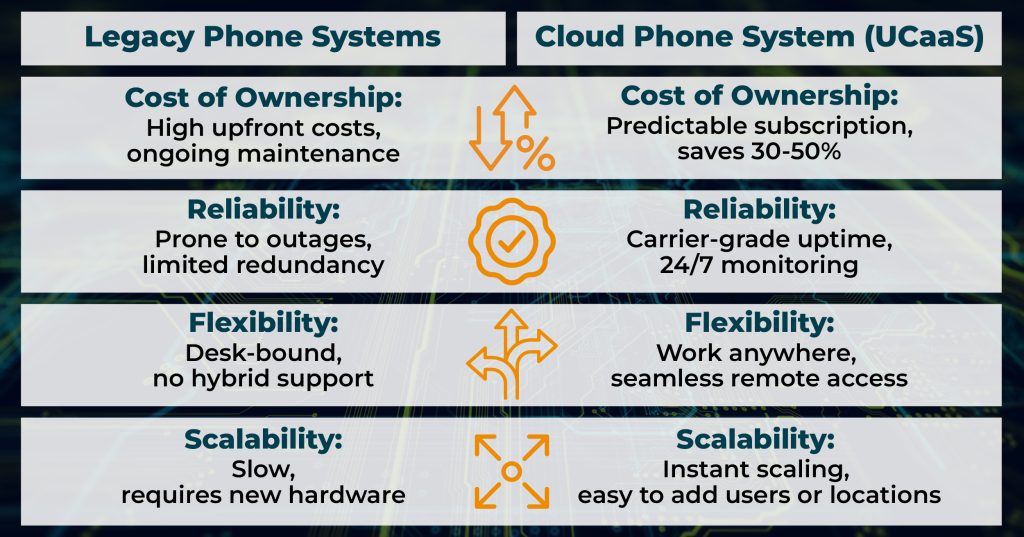For decades, legacy business phone systems like PBX were the backbone of company communications. But in 2025, many organizations are finding that these systems no longer meet the needs of a hybrid workforce, customer-facing teams, or businesses trying to scale.
Cloud phone systems, powered by VoIP and Unified Communications as a Service (UCaaS), have emerged as the modern alternative. According to Gartner, more than 70% of businesses are using UC or plan to adopt it within the next year. The question many leaders face is: should we hold on to our legacy system or make the move to the cloud?
This guide breaks down the differences, the risks of staying with outdated technology, and what modern companies should consider before making the switch.
What Is a Legacy Business Phone System?
A legacy business phone system typically refers to on-premise hardware like PBX (Private Branch Exchange). These setups relied on physical wiring, proprietary equipment, and
phone lines managed by carriers. While they once served as the backbone of company communication, they come with several challenges that modern businesses can no longer ignore:
- Maintenance-heavy: Legacy systems require constant upkeep and vendor support
- Limited flexibility: Employees are tied to desk phones and fixed extensions
- High upfront investment: Hardware, licensing, and ongoing service contracts
- Outdated features: Minimal support for mobile, video, or modern collaboration tools
For many businesses, what once worked reliably is now a barrier to productivity.
What Is a Cloud Business Phone System?
A cloud phone system (also called VoIP or UCaaS) moves calling, messaging, and meetings into a secure, cloud-hosted platform. Instead of relying on on-site equipment, businesses connect over the internet using desktop, mobile, or desk phones.
- Scalable: Add or remove users instantly without installing new hardware
- Cost-effective: Subscription-based pricing replaces large capital expenses
- Feature-rich: Video conferencing, call routing, voicemail-to-email, and integrations with Microsoft Teams or CRM tools
- Mobile-ready: Employees can take calls and join meetings from anywhere
For companies with distributed teams or customer service operations, cloud systems deliver flexibility legacy platforms cannot match.
Legacy vs Cloud: The Key Differences
⭑ Cost of Ownership
Legacy systems involve heavy upfront costs, licensing fees, and ongoing maintenance. By moving to UCaaS, organizations can reduce telecom costs by 30 to 50% (TechTarget).
⭑ Reliability and Uptime
Outdated equipment is prone to outages, especially without redundant infrastructure. Cloud systems are backed by carrier-grade networks, redundant data centers, and Service Level Agreements (SLAs) that guarantee uptime.
For small and medium-sized businesses, downtime can quickly add up. Research shows that SMBs lose between $127 and $427 per minute of downtime (Pingdom) Even brief outages can drain resources, frustrate customers, and hurt client relationships.
⭑ Flexibility and Remote Work Support
Legacy systems tie employees to their desks. Cloud phone systems give staff the freedom to use a single business number across devices, whether in the office, at home, or on the road. This matters as hybrid work continues to be the standard, and Gallup reports that 53% of employees now work in a hybrid model (Gallup).
⭑ Scalability for Growth
Expanding with legacy hardware means purchasing new equipment and waiting for installation. Cloud phone systems let you scale instantly, supporting small businesses through to multi-location enterprises.

Why Modern Companies Are Moving to Cloud Phone Systems
Business communication today is about more than dial tone. Customers expect quick responses, employees expect mobility, and IT leaders expect reliability. Cloud phone systems align with these expectations by:
- Enabling hybrid workforces without compromising productivity
- Enhancing customer experience with better call routing and faster response times
- Reducing IT complexity by consolidating multiple tools into one platform
- Delivering future-ready features through regular updates and integrations
For many companies, the move is not just about upgrading technology. It is about staying competitive. Learn more about Aureon’s Unified Communications solution and how it can support your team.
Choosing the Right Partner for Cloud Communications
A cloud phone system is only as reliable as the partner behind it. Aureon’s UCaaS solution combines:
- Microsoft Teams TM integration that enhances a tool employees already use
- Carrier-grade infrastructure with redundant data centers and a high-availability voice backbone
- 24/7 Midwest-based support from experts who understand business communication
- Scalable options designed for companies of every size, from local offices to multi-site enterprises
By moving beyond legacy systems, modern companies gain more than new features. They gain peace of mind, knowing their communications are secure, reliable, and ready to scale.
Book a demo today to see how Aureon can modernize your business phone system and prepare you for the future of work.




